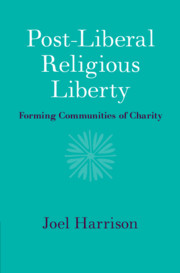Book contents
- Post-Liberal Religious Liberty
- Post-Liberal Religious Liberty
- Copyright page
- Dedication
- Epigraph
- Contents
- Acknowledgements
- Table of Cases
- 1 Introduction
- 2 The Liberal Egalitarian Account
- 3 Secularisation Challenged
- 4 Modern (Christian) Responses
- 5 The Ecclesiological Account
- 6 Pluralism and Disagreement
- 7 Conclusion
- Select Bibliography
- Index
2 - The Liberal Egalitarian Account
Published online by Cambridge University Press: 06 July 2020
- Post-Liberal Religious Liberty
- Post-Liberal Religious Liberty
- Copyright page
- Dedication
- Epigraph
- Contents
- Acknowledgements
- Table of Cases
- 1 Introduction
- 2 The Liberal Egalitarian Account
- 3 Secularisation Challenged
- 4 Modern (Christian) Responses
- 5 The Ecclesiological Account
- 6 Pluralism and Disagreement
- 7 Conclusion
- Select Bibliography
- Index
Summary
Legal discourse increasingly struggles to understand why religious liberty matters. Many prominent scholars have suggested religion is one possibility in the individual’s cultivation of authenticity, or a species of the individual’s ethical freedom – albeit one that, nevertheless, still raises difficulties for secular authority. On this account, accommodating religious belief when it clashes with the general law, providing favourable tax relief for religious bodies, or endorsing religious belief as part of the state’s identity is problematic. These are possible instances of illegitimate discriminatory action. By singling out religion as a category for special demand or special solicitude, they are contrary to equality. Why religion, rather than any other form of individual commitment? Why should the state, concerned with facilitating and negotiating diverse conceptions of the good life, afford religion such privileges?
- Type
- Chapter
- Information
- Post-Liberal Religious LibertyForming Communities of Charity, pp. 25 - 58Publisher: Cambridge University PressPrint publication year: 2020

